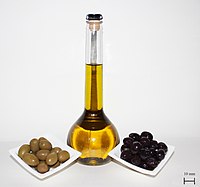
Photo from wikipedia
Introduction: Christian Orthodox fasting is a pattern high in complex carbohydrates and low in refined carbohydrates. It has been explored in association with its potential health benefits. The present review… Click to show full abstract
Introduction: Christian Orthodox fasting is a pattern high in complex carbohydrates and low in refined carbohydrates. It has been explored in association with its potential health benefits. The present review aims to comprehensively explore the existing available clinical data concerning the potential favorable impact of the dietary pattern of Christian Orthodox fasting on human health. Methods: PubMed database, Web of Science and Google Scholar were extensively searched in order to identify the more appropriate clinical studies that explore the effect of Christian Orthodox fasting on health-related outcomes in humans utilizing relative keywords. We initially retrieved 121 records through database searching. After applying several exclusion criteria, 17 clinical studies were finally included in this review study. Discussion: Christian Orthodox fasting showed beneficial effects concerning glucose and lipid control, whereas the data for blood pressure remain inconclusive. Concerning weight control, fasters were characterized by lower body mass and lower caloric intake in the course of the fasting periods. During fasting, this pattern is higher in fruits and vegetables, showing the absence of dietary deficiencies for iron and folate. Nevertheless, dietary deficiencies were recorded for calcium and vitamin B2, and also hypovitaminosis D has been noticed in monks. Interestingly, the vast majority of monks do present with both good quality of life and mental health. Conclusions: Overall, Christian Orthodox fasting is a dietary pattern low in refined carbohydrates and high in complex carbohydrates and fiber that may be beneficial for human health promotion and chronic disease prevention. However, further studies are strongly recommended on the impact of long-term religious fasting on HDL cholesterol levels and blood pressure.
Journal Title: Nutrients
Year Published: 2023
Link to full text (if available)
Share on Social Media: Sign Up to like & get
recommendations!